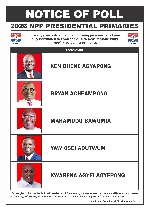Ghana pushes for data-driven TVET system at national workshop
 Mr. Kevin Antierku
Mr. Kevin Antierku
Ghana’s ambition to transform its Technical and Vocational Education and Training (TVET) sector took a major step forward this week as policymakers, educators, and development partners gathered in Accra for a two-day workshop on evidence-based monitoring and reporting.
Organised by the Commission for Technical and Vocational Education and Training (CTVET), the event stressed the urgent need for accurate and timely data to guide policies that align Ghana’s skills development agenda with the labour market demands.
Opening the workshop, Mr. Kevin Antierku, Deputy Director at the Ministry of Education’s TVET Directorate, warned that without reliable data, Ghana risks “misallocating resources and missing opportunities” to harness TVET for socio-economic growth.
Echoing the point, Mr. Anthony Seyram Kwame Zu, Deputy Director-General of CTVET, described data as “the bedrock of planning, monitoring, and accountability.”
International partners, including UNICEF’s Christin Lucille McConnell and Julia Olesen of Germany’s Federal Institute for Vocational Education and Training (BIBB), reinforced the need for robust data systems, with Ms. McConnell calling data “a foundation for equity, accountability, and efficiency.”
Day One featured panel discussions and academic presentations from Takoradi Technical University, AAMUSTED, Accra Technical University, and the Ghana Education Service, showcasing innovations such as the Mobile School Report Card initiative.
Day Two shifted focus to practical strategies.
Working groups examined four key areas: strengthening management information systems, improving data quality, developing policy indicators, and enhancing institutional coordination.
Recommendations included stronger graduate tracer studies and better tracking of informal apprenticeship training, a critical but underreported pillar of Ghana’s skills sector.
Closing the workshop, Mr. Zu stressed that Ghana’s TVET system remains too fragmented and underutilised to effectively guide decision-making.
“Without accurate and timely information, decisions risk being based on assumptions,” he cautioned.
The event brought together representatives from the Ghana Statistical Service, the National Development Planning Commission, trade associations, universities, and global partners such as UNESCO, UNICEF, ILO, and GIZ.
Stakeholders agreed that while progress has been made, building a data-driven TVET system remains essential to equip Ghana’s youth for the demands of a rapidly evolving labour market.
Source: Classfmonline.com/Edem Afanou
Trending News

Mahama handed youth the baton, they must now run
06:57
Private security guards engage gov't to improve working conditions
13:56
Parliament to resume on Oct 21
22:57
GA/R: Avenor Electoral Area Committee member raises concern over incomplete road project
15:03
O/R: 15 die in tragic boat accident on Volta Lake near Kete Krachi
08:52
Gov't refutes reports on alleged introduction of sports levy — Says Cabinet has not approved any such measure
13:40
Okuapemhemaa halts Odwira festival, demands justice over disputed Okuapeman stool
22:05
W/R: Hundreds surrender to NAIMOS Taskforce in anti-galamsey crackdown in Aboso
17:00
Provide a payment plan for customers in arrears - Energy Minister to NEDCo
05:43
Kennedy Agyapong leads Bawumia and others on NPP ballot
13:01




